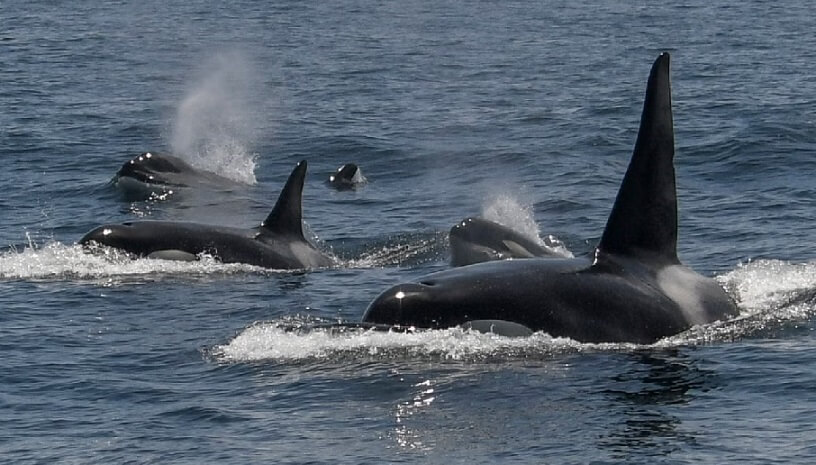
Orca Rams Into Yacht Near Scotland, Suggesting The Behaviour May Be Spreading
The incident occurred roughly 2,000 miles away from the recent encounters near Spain and Portugal
By: Sarah Kuta | Smithsonian
Orcas have been ramming into ships off the coasts of Spain and Portugal and making headlines worldwide, but until now, the behaviour appeared contained to that one population. Last week, however, one of these black-and-white mammals slammed into a yacht between Scotland and Norway, some 2,000 miles away from the Iberian orcas.
Though scientists don’t quite know what to make of the recent incident, they say it might mean the behaviour is spreading. This is believed to be the first known orca-boat encounter in northern waters, as Philip Hoare and Jeroen Hoekendijk report for the Guardian.
On June 19, Dutch sailor Wim Rutten spotted an orca in the waters of the North Sea while traveling east from the Shetland Islands of Scotland. Rutten, 72, was using a single line off the back of the boat to fish for mackerel, when seemingly out of nowhere, the orca rammed into the stern of his seven-ton, aluminium hull yacht.
The creature then proceeded to hit the vessel multiple times. It swam behind the boat and appeared to be searching for the keel, or the main structural support that runs along the bottom of a boat’s hull from front to back. The orca got so close that Rutten could hear its “very loud breathing,” he tells the Guardian.
Watch A Great White Become An Orca’s Lunch In World-First Footage
“Maybe he just wanted to play,” he adds to the publication. “Or look me in the eyes. Or to get rid of the fishing line.”
Though the incident shook him up a bit, Rutten made it home safely.
Scientists are intrigued that this behaviour occurred so far away from the Iberian orcas. One possible explanation is that the North Sea orca was a juvenile that simply got curious about the fishing line coming off the back of Rutten’s boat. However, the behaviour could have spread from the Spain and Portugal subpopulation, perhaps transmitted by very mobile orcas.
“It’s possible that this ‘fad’ is leapfrogging through the various pods/communities,” says Conor Ryan, an independent researcher who advises the Hebridean Whale and Dolphin Trust, to the Guardian.
Meanwhile, off the Iberian coast, the boat-ramming behaviour is still going strong: Last week, a pod of orcas slammed into a yacht as it got near the Strait of Gibraltar during the Ocean Race, an around-the-world sailing competition. The group on the yacht took down its sails and slowed their vessel as much as possible, and the orcas stopped bashing the ship soon after.
In a statement, Jelmer van Beek, the team’s skipper, described the incident as a “scary moment.”
“[It was] impressive to see the orcas, first of all, beautiful animals, but also a dangerous moment for us in the team,” he says in a video by the Ocean Race.
Warning: The Video Contains Profanity
In the case of the orcas off the coasts of Portugal and Spain, scientists suspect that a female named “White Gladis” may be at least partially responsible for the recent interactions: They worry she had a traumatic run-in with a boat that gave rise to the new behaviour, which other orcas are now learning via observation.
Since the summer of 2020, scientists have recorded more than 500 incidents involving contact between the Iberian orcas and boats, including three that resulted in the vessels sinking, per Live Science’s Sacha Pare. About 20% of the encounters damaged the boats so badly they could not continue sailing. And in one recent incident, a group of orcas in the Strait of Gibraltar followed a boat all the way into port, even after they’d destroyed its rudder.
ORCA ATTACK: A killer whale is filmed ripping the rudder blade off of a boat sailing off the coast of Gibraltar, the latest in a series of incidents that have seen the predators targeting ocean vessels. https://t.co/VGYQ1StKnF pic.twitter.com/V5tyZgwWWb
— ABC News (@ABC) June 14, 2023
In Spain, authorities are now tagging and tracking six of the Iberian orcas that have been involved in the incidents. Next, they want to share the animals’ locations with sailors in hopes of avoiding future interactions.
However, not everyone supports this plan. Alfredo López Fernandez, a biologist at the University of Aveiro and a member of the Atlantic Orca Working Group, has been studying the interactions and believes shooting satellite tags at the whales will only aggravate the creatures further.
“The orcas will surely not find it very funny,” he tells RTVE’s Samuel A. Pilar.
* * *
NEXT UP!
Great White Sharks Are Being Scared From Their Habitat By Just 2 Predators
There is no sea creature whose name inspires terror – rightly or wrongly – as much as the great white shark.
With its sleek body optimized for hunting, its sharp teeth, and its (somewhat undeserved) reputation for enjoying human flesh, the great white (Carcharodon carcharias) is widely regarded as one of the ocean’s top predators.
And that’s true, it is – but there’s something even the great white fears.
* * *
READ MORE: Fossilized Fish Discovered On The High Altitude Himalayas!
Read more on Marine News: Octopuses Can Rewire Their Brains To Brave Chilly Waters
Liked it? Take a second to support Collective Spark.
We’d love to hear from you! If you have a comment about this article or if you have a tip for a future Collective Spark Story please let us know below in the comment section.
